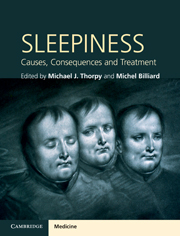Book contents
- Sleepiness
- Sleepiness
- Copyright page
- Contents
- Contributors
- Foreword
- Preface
- Abbreviations
- Section 1 Introduction
- Section 2 Sleep Disorders and Excessive Sleepiness
- Chapter 10 Sleep deprivation: biomarkers for identifying and predicting individual differences in response to sleep loss
- Chapter 11 Narcolepsy
- Chapter 12 Idiopathic hypersomnia
- Chapter 13 Kleine–Levin syndrome
- Chapter 14 Menstrual-related hypersomnia
- Chapter 15 Sleepiness due to sleep-related breathing disorders
- Chapter 16 Daytime sleepiness in insomnia patients
- Chapter 17 Sleepiness in advanced and delayed sleep phase disorders
- Chapter 18 Shift work disorder and sleepiness
- Chapter 19 Sleepiness in healthcare workers
- Chapter 20 Sleepiness in the military: operational implications and research imperatives
- Chapter 21 Time-zone transitions and sleepiness
- Chapter 22 Restless legs syndrome and periodic limb movements and excessive sleepiness
- Chapter 23 Long sleepers
- Chapter 24 Sleepiness in children
- Section 3 Medical, Psychiatric and Neurological Causes Of Sleepiness
- Section 4 Therapy of Excessive Sleepiness
- Index
Chapter 10 - Sleep deprivation: biomarkers for identifying and predicting individual differences in response to sleep loss
from Section 2 - Sleep Disorders and Excessive Sleepiness
Published online by Cambridge University Press: 04 February 2011
- Sleepiness
- Sleepiness
- Copyright page
- Contents
- Contributors
- Foreword
- Preface
- Abbreviations
- Section 1 Introduction
- Section 2 Sleep Disorders and Excessive Sleepiness
- Chapter 10 Sleep deprivation: biomarkers for identifying and predicting individual differences in response to sleep loss
- Chapter 11 Narcolepsy
- Chapter 12 Idiopathic hypersomnia
- Chapter 13 Kleine–Levin syndrome
- Chapter 14 Menstrual-related hypersomnia
- Chapter 15 Sleepiness due to sleep-related breathing disorders
- Chapter 16 Daytime sleepiness in insomnia patients
- Chapter 17 Sleepiness in advanced and delayed sleep phase disorders
- Chapter 18 Shift work disorder and sleepiness
- Chapter 19 Sleepiness in healthcare workers
- Chapter 20 Sleepiness in the military: operational implications and research imperatives
- Chapter 21 Time-zone transitions and sleepiness
- Chapter 22 Restless legs syndrome and periodic limb movements and excessive sleepiness
- Chapter 23 Long sleepers
- Chapter 24 Sleepiness in children
- Section 3 Medical, Psychiatric and Neurological Causes Of Sleepiness
- Section 4 Therapy of Excessive Sleepiness
- Index
Summary
Keywords
- Type
- Chapter
- Information
- SleepinessCauses, Consequences and Treatment, pp. 101 - 110Publisher: Cambridge University PressPrint publication year: 2011



